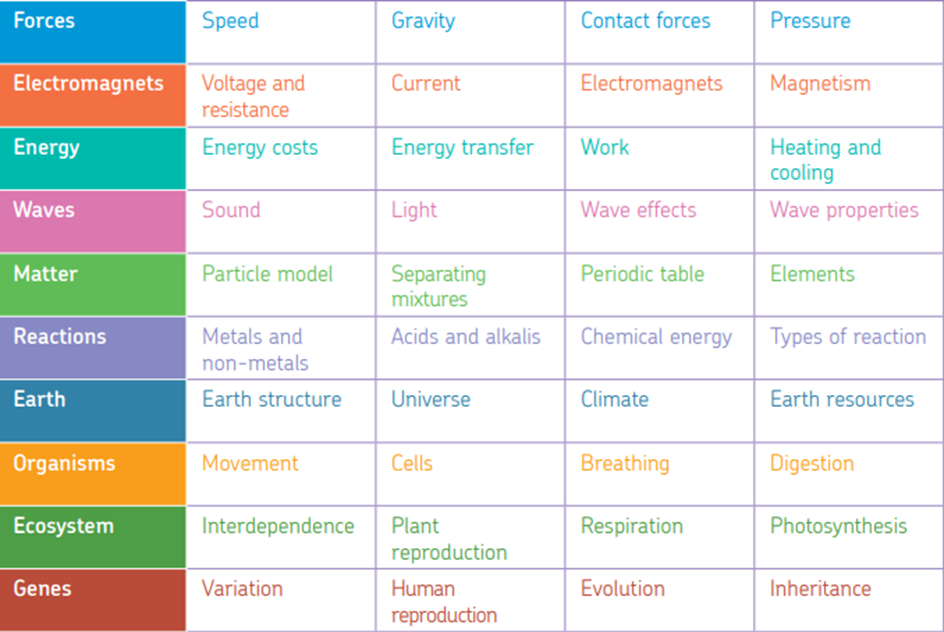Science
Our aim is to give you a broad and balanced education in science, which will help you to:
- Understand the importance of science in everyday life.
- Learn about the fascinating and curious world in which we live.
- Develop investigative skills.
- Be prepared to make informed decisions about scientific issues that will influence your life now and in the future.
Teachers will provide you with the opportunity to plan and carry out investigations, complete problem-solving tasks, and to discuss and write about your findings. You will also have the opportunity to make sense of scientific information presented in a variety of interesting ways.
Key Stage 3 Science
The curriculum at Key Stage 3 is designed around The Big Ideas in Science where students gain knowledge of a wide range of scientific concepts and skills. They learn to apply this knowledge to unfamiliar contexts. Using the big ideas principle, the generalisations, principles and models which connect concepts are at the heart of our curriculum. We believe this is how students learn to see the world analytically, to explain phenomena and make predictions – all skills they need for their next stage of scientific learning. Students cover Biology, Chemistry and Physics topics under the 10 big idea headings: Forces, Electromagnetism, Energy, Waves, Matter, Reactions, Earth, Organisms, Ecosystems and Genes. Each idea contains four smaller topics: the building blocks for the big ideas:

The GCSE course, outlined below, teaches students a wide range of scientific content and processes in greater depth. The foundations to allow students to be successful are developed in Key Stage 3 so that students enter Key Stage 4 with a broad range of knowledge and skills to high level of proficiency.
Key Stage 4 Science
Description of combined science
Combined Science: Trilogy is offered to all students who have not chosen Triple Science as an option. The course focuses on scientific explanations and models, and gives students an insight into how scientists develop scientific understanding of ourselves and the world we inhabit. Students study a wide range of Biology, Chemistry and Physics topics with practicals, including many required practicals, covered throughout the course. The content follows the AQA exam board specification.
How the course is assessed
Combined science is assessed using an external terminal exam at the end of year 11, which will represent 100% of the final grade. There is no coursework aspect of the course. Students will sit 6 x 1 hour 15 minute exams, with each exam worth 16.7%. Students sit paper 1 and paper 2 for Biology, Chemistry and Physics with different topics assessed in each exam. The exams include exam questions, which are a mixture of multiple choice, structured, closed short answer, and open response questions. Students will gain two GCSE grades, which is calculated based on their score for all six exam papers.
Separate Science: TRIPLE Science (GCSE)
Option subject
Our aim is to give you a broad and balanced education in science, which will help you to:
- Understand the importance of science in everyday life.
- Learn about the fascinating and curious world in which we live.
- Develop investigative skills.
- Be prepared to make informed decisions about scientific issues that will influence your life now and in the future.
Teachers will provide you with the opportunity to plan and carry out investigations, complete problem solving tasks, and to discuss and write about your findings. You will also have the opportunity to make sense of scientific information presented in a variety of interesting ways.
Description of separate science
The course focuses on scientific explanations and models, and gives students an insight into how scientists develop scientific understanding of ourselves and the world we inhabit. Students study a wide range of Biology, Chemistry and Physics topics in great depth with practicals, including many required practicals, covered throughout the course. The content follows the AQA exam board specification; students will receive a separate grade for each of the separate sciences. Students will have a different teacher for each of the separate science classes; the teacher will be a subject specialist in that subject. Triple science is recommended for students targeted to achieve at least a grade 6 in science who want to go onto to study science at A Level and beyond.
How the course is assessed
The Triple Science course will include 6 x1 hour 45 minute exams. This will result in three GCSE grades, one for Biology, Chemistry and Physics. Two exams for Biology worth 50% each of the Biology grade, two exams for Chemistry worth 50% each of the Chemistry grade and two exams for Physics worth 50% each of the Physics grade. The exams include exam questions that are a mixture of multiple choice, structured, closed short answer, and open response questions.
Curriculum Plans
Curriculum plans for Science can be viewed from the links below.

